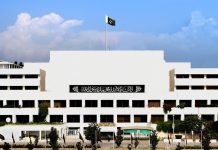
KARACHI: As both sides have brought new demands to closed-door meetings, the US and the Taliban are struggling to find ways to resume peace talks to end the war in Afghanistan, say both officials and local analysts. A 12-member delegation of the Afghan Taliban political office in Doha arrived in Pakistan’s capital Islamabad on Wednesday at the invitation of the government, the first-ever visit of a Taliban delegation there since the insurgents established their political office in Qatar in 2013.
Zalmay Khalilzad, the special US envoy for Afghan reconciliation, along with his team had already arrived in Islamabad on Tuesday before the Taliban delegation.
A senior Pakistani foreign ministry official confirmed “at least one meeting” between Khalilzad and the Taliban delegation led by the militia’s deputy chief, Mullah Abdul Ghani Baradar, “to discuss different ways to resume the talks.”
“The two sides haven’t reached any decision. The deadlock is still there, but both [sides] have vowed to break the deadlock,” the official told Media but declined to be identified as he was not authorised to publicly speak on the matter.
“Another meeting is expected in a day or two after both sides complete their homework on different formulas discussed in the first meeting,” he added.
The two sides, he asserted, had come up with new demands, with Washington demanding a “total” ceasefire in the war-wracked country, and inclusion of the fragile Kabul government in the peace process — both conditions the Taliban has time and again rejected. The Taliban, for their part, the official said, had sought a “guarantee from the highest level” in Washington on implementation of the talks’ outcome.
“The Taliban have refused to accept the two US demands, and want the process to be resumed from right where it broke off. Washington wants a fresh start, particularly with respect to its two demands.”
On September 9, US President Donald Trump abruptly cancelled a meeting with representatives of the Afghan government and the Taliban at the US Camp David retreat. Trump declared the peace talks with the Taliban “dead” following a recent attack in Afghanistan’s capital Kabul which killed a dozen people, including a US service member. Following the US move, the Taliban opened new battlefronts across the war-torn nation, as Afghan security forces — suffering casualties and desertions — struggle to beat back a revitalised insurgency. Meeting last month on the sidelines of the UN General Assembly in New York, Prime Minister Imran Khan asked Trump to resume peace talks with the Taliban. – Agencies
Rahimullah Yusufzai, a Peshawar-based expert on Afghan affairs, sees “bright” chances for the resumption of the process despite the rigid stances of both Washington and the Taliban.
“Both sides are testing each other’s nerves. But ultimately, they will agree on resumption of talks as they have realised the fact that there is no other solution,” Yusufzai told Media.
Washington, according to him, is more “rigid” and wants “something extra” from the Taliban to justify resuming the talks.
Echoing the Pakistani official’s words about fresh US demands, Yusufzai said, “There’s more pressure on Washington this time as it has to justify its readiness to revive the broken-off process not only before its own people but the whole world, including Kabul.”
According to him, the two sides will reach an agreement under which the Taliban will “significantly” reduce its attacks on Afghan and foreign forces, and in return, the US will halt its airstrikes against the militia.
“The Taliban, too, have realised that they could get more through talks than through the war. Therefore, I believe, they will agree to give some more concessions to Washington,” he said.
“Pakistan will also push the Taliban for that,” added.
Lieutenant General (retired) Talat Masood, an Islamabad-based security analyst, voiced a similar view.
“Eventually the talks will resume. It’s just a matter of time,” Masood told Media.
“Otherwise, the US will remain entangled in Afghanistan, which it does not want to.”
He said Washington wanted to put more pressure on the Taliban through breaking off the process as it had realised the militia’s “keenness” to end the war.
“I believe that the Taliban have to bow to the US demands, particularly the ceasefire, to an extent, otherwise the US won’t agree to resume the peace process,” he said. – Agencies



